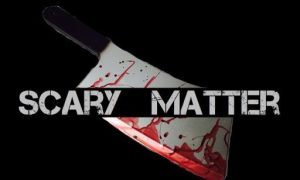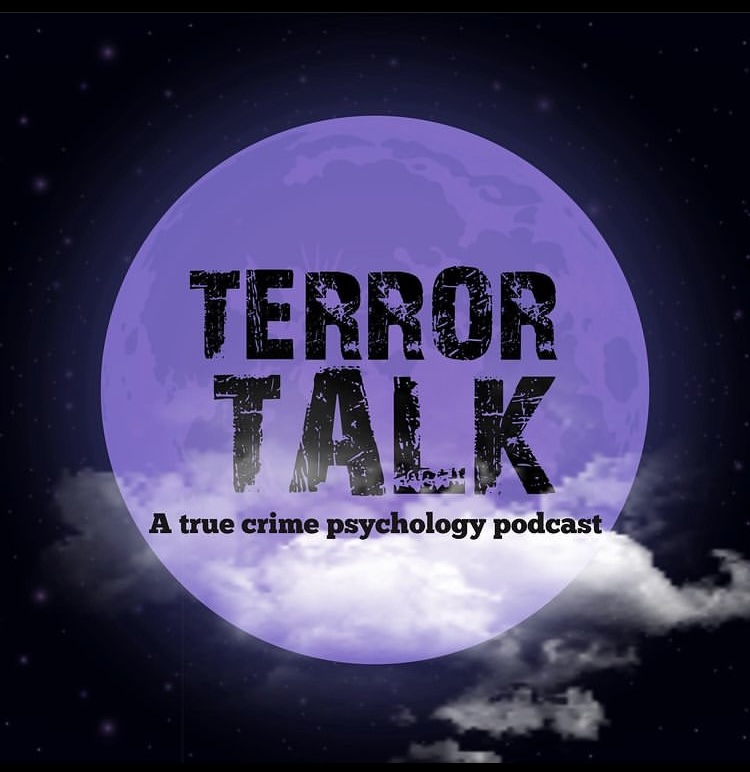
Terror Talk Podcast
The Terror Talk podcast is hosted by Shannon Sharee, a licensed therapist, and Cathy Barrett, a forensic psychologist. They use their psychological backgrounds to discuss true crime, criminal psychology, and horror with a touch of humor. They have fun segments like ‘What the Hell?’ where they read a news story that will have you asking that very question. And they have five questions for us each week- but you have to wait for the end of the episode to get the answers.
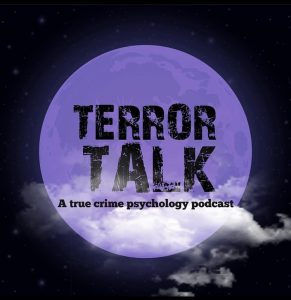
I had the pleasure of chatting with Shannon and Cathy recently. It was around noon here in New York and around nine in California. They were real troopers and lovely to talk to.
Scary Matter: I want to thank you both for taking the time to talk to me so early in the morning!
Cathy: Well first of all we want to thank you for being a listener and being involved with our podcast. We appreciate you.
SM: Just to get my facts straight- you met while studying psychology? So how did the podcast come about?
Cathy: We met in 2012 during our doctoral training, at a substance abuse rehabilitation center training facility. We went to different schools, and Shannon can also say too, we just kind of clicked as friends right away. Shannon if you remember, the first couple of days of training you and I were just dying of laughter at stuff.

Shannon: Yeah, I think it was mostly our sense of humor that we clicked on and there was a rhythm. You know how when you meet someone new or you sort of are making friends in a new environment and there’s usually just one or two people – well if you’re lucky, there’s at least one person– where you have sort of a similar rhythm, just like a similar view of the world or whatever.
Cathy: It progressed from there to both of us finding out that we were obsessed with Halloween. So we’re sitting one day in this back trailer that we would do all of our paperwork and stuff in. Shannon’s birthday is in August and she looks over and I’m like let’s think about doing a Halloween party this year. And in August I’m on some website already looking for stuff for this party and then it’s our obsession.
SM: Oh, you’re my people!
Cathy: I’m an October baby too so it was very organic. For the first few years, we did these really big Halloween parties at Shannon’s house where we would do the whole backyard as this cemetery with fog machines and blah blah blah. And then our friendship just grew from there. Then Shannon one day was like, ‘I’m really thinking you and I should do a podcast.’ It was really her idea as far as incorporating her clinical work with my forensic work and our expertise and love for horror and all of that. She’s the one that really navigated, executed, and organized this whole thing and I’m like “Just tell me where to show up, and let’s do this.”
SM: I love the fact that you use your psychology background in your podcast without getting boring. You make me laugh.
Shannon: Hopefully this comes across, and we’ve said this on the show before, but we don’t plan our dialogue. We just have a really fun time and it’s very organic. That’s our friendship.
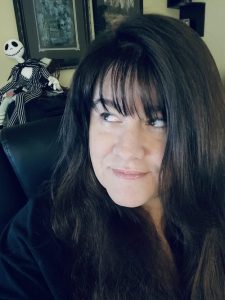
SM: I can tell. You don’t sound rehearsed.
Shannon: I think that’s one of the unique things about our friendship too. Obviously, we don’t all find good friends throughout our lifetime- there’s usually really only a handful along the way. I think one of the things is that we have so much in common and such a rapport and rhythm. Like the horror that we like or sometimes, with our psychological perspective on something. I just felt like when I was kind of formulating the idea of ‘how do we take what we are and who we are and make it a creative endeavor’? But also not end up hating each other and also really amplifying our differences because that’s part of what people want to hear as well. We’ve been doing this for four years and it took a couple of years to really sort of find a groove, and for me to figure out everything technically and to just kind of explore. We still keep exploring. I’m technically the producer of the show. We’re always kind of trying to change it and do different things. Go with what feels right, go with what’s working, go with what people are telling us they like and we just kind of explore that. Which, I think Cathy would agree, it’s been really supportive and edifying for our lives and our professions.
Cathy: I think one of our strengths as far as working together- is we’re both very flexible in ‘Let’s try this!’ or, Shannon will say “Hey, how do you feel about changing this stuff?” And it’s like ‘Let’s do it.’ We are very open to making changes even at the last minute. There are times when it would be like, “This topic came up this week and I know we’re not planning on recording that this Sunday, how do you feel about discussing it?’ And I’m like ‘Oh, I have a lot to say about that.’
Shannon: We can always count on Cathy- you always have a lot to say about something!
SM: [laughing] That’s why I have a website and not a podcast. Everybody tells us ‘You know, you should turn Scary Matter into a podcast’ but we can’t stop talking to each other and we never stay on topic.
Cathy: I think a strength for us is our ability to change things last minute, thoughtfully of course. That we can move things because we know that on top of what’s going on publicly and socially that there are times that things will come up and it’s like we need to talk about that now because it’s going to be outdated. So we’ll just shift our whole schedule and throw it in there at the last minute.
SM: But what’s your process? Who picks the topic and does the research and all that stuff? Or does it just happen?
Shannon: Oh no, I wish, right? If only it dropped from the sky kind of like your articles and things, right? Like if only it flowed out of every day so naturally.
SM: I have a book full of stuff that I want to write. Sometimes when I start writing them and I have to do research, especially when it’s true crime or a serial killer or something like that, I just go down the rabbit hole.
Shannon: Yeah, totally. The basic process has shifted a few times over the years. There was a time when the process was that I would get together with Cathy, we would kind of have what I call a production meeting and we would kind of plan out a few months. But what we’re doing now is just planning the next 2-4 weeks at any given time. We get together every couple of weeks and record a couple of episodes and some mini casts and stuff for our Patreon. As far as the topics are concerned, we each sort of bring ideas to the table every time we record. like okay, what do we want to do next? The reason why I said I don’t want to program out a few months in advance anymore is because of these kinds of hot topics. We were kind of wanting to be more current in what we were discussing. We also found that two months later we weren’t necessarily interested in a topic like we were two months ago. And then what happens is we have our topics for the next time. Then we go away and if it is a larger topic like Cathy or myself wants to bring a particular criminal pathology to the show or whatever, it’s basically on that person to kind of guide the other person. So if she picks a forensic topic of some kind and says she wants to do that, she’ll just let me know and I’m like, ‘What do I need to watch? What do I need for me to make it a good conversation?’ and vice versa.
SM: I love how, depending on what you’re talking about, one of you will step back depending on whose background is better to discuss it. And you’ll step back and be like, you know, okay, Shannon you talk about this one, it’s yours or I’ll take this one, it’s mine. I really like that about you ladies.
Cathy: I’m glad. We try to play to each other’s strengths. I think that’s where our friendship is solid because there’s no ego. We’re not trying to one-up each other. We bring very different things and that is embraced. It’s never competitive. It’s always like ‘Go for it, that’s your area.’ And I’ll say ‘Shannon, I want you to talk more about that from your psychodynamic, your perspective.’ Because we are bringing very different things, this is what makes the show. If we were doing the exact same thing with the exact same opinion, that’d be very boring, I would imagine.
Shannon: Because we have a Patreon, we will watch some movies together with the listeners but we also just go and watch whatever we want to watch. My process is just to say – Okay, we’re doing the review segment, what do you got?’ She’ll say “I have two movies and a book” or “I have a documentary and a movie and a TV series” and I’ll just kind of write those down on my sheet. I just need to know what she’s bringing so I know I’m not cutting her off at the end before she’s done. Then I’ll just guide it like, ‘Okay, I’m gonna talk about this movie, what are you watching?’ And I’ll flip it back to her and then she just kind of follows my lead in that way. We record in the same studio so physically I can tell she’s done. We both read behavior for a living as well too, so that helps.
SM: We recently just watched a movie and I’m trying to write about it because it literally punched me in the face. (Sorry readers, you’ll have to wait to find out which one!) I thought about you guys and I was like, ‘If they haven’t seen this then they have to!’ We’re trying to psychoanalyze it like we are amateur psychologists. When I write, I try to always remember to put in the articles that I have NO psychology training… but here’s what I think.
Shannon: That’s kind of our audience, really. A lot of our audience is psych students – people who are younger in the field or are just interested. And a lot of people that are in our culture, are fascinated with true crime and horror and different things. People are interested in the psychological perspective on that, even if they’re not psychologists. So that’s literally our audience in so many ways. And then there are some strict horror fans, of course.
SM: Have you found that during Covid your listeners spiked? I feel like since everyone was stuck in the houses they just all started watching true crime and it’s so popular.
Shannon: I’ll just go for that because I have access to the data. The first few weeks of Covid, our listenership plummeted because everybody was watching the news. And that happens anytime there’s a world tragedy, people shut off their radios. They don’t listen to podcasts unless it’s a news podcast and they go heavy into that. I would say our growth over the course of Covid was pretty steady. I didn’t actually associate it with Covid because it’s not like when we went back our listenership radically changed.
Cathy: We ended up addressing a lot of the mental health stuff at the beginning of our show through Covid and just normalizing things for people. I was transparent a couple of times about my own state of mind, you know, kind of normalizing for people who were listening that we’re all going through it. It really did get bad for people and for Shannon and myself, who both treat clients. You go from having one or two people in crisis on your caseload to very many. And then you’re trying to manage your own stuff.
SM: That had to be hard.
Shannon: It was hard. And so the podcast became this really great outlet for ‘Hey, let’s try to step away from the seriousness and all that. Let’s also give the audience something to laugh about and be excited about,’ and connect this way because it did get incredibly isolating and so we tried to use the podcast as a way to help people connect during that time too.
SM: I’m still catching up on the older episodes of your show. You keep me company while I’m doing the dishes or cleaning. I can’t write and listen at the same time, my brain doesn’t work that way.
Shannon: I know, for most of us, it doesn’t really work that well. Season one is mostly not available. I’m in the middle of revamping our website, which is at least design-wise, the way I wanted.
SM: I noticed- it looks good!
Shannon: Oh thanks, yay!
SM: I want that coffee cup from your shop!
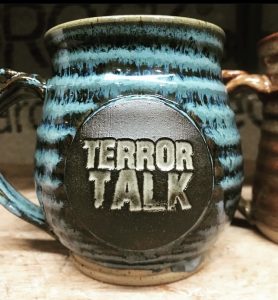
Shannon: Those mugs are awesome. It’s probably the thing that we’re most proud of, as far as the merchandise is concerned. I’m in the middle of a project of re-editing and then writing blog posts for each episode as far as the archive. I think I only have like two up so far on the website. So, that first season, there’s a lot of great content. We did a lot of serial killer series. But the sound was bad and I wasn’t editing anything. Literally, we would record and I would put it on the channel like “Let’s just go, let’s just get going”.
SM: Do you find, as psychologists, that changes the way you watch movies? Are you able to just sit back, get into the movie, and not think about anything else? Because we have a tendency to analyze as we’re watching movies.
Shannon: I have a background working as a post-production supervisor for TV. I do have a way where if it’s an assignment for the show (like if we’re going to do a documentary or we’re talking about a particular artist and we’re going to watch all of their movies) I’m gonna watch with an eye and I’m going to take a few notes along the way. Then later I’m going to look at the notes and kind of formulate my opinions and ideas. If it’s just me throwing in movies then I’m going to review them on the show. But I don’t always know that that’s the movie I’m going to take to the show. So I have a pretty well-developed ability to not analyze movies as I’m watching them. But I think both processes are happening at the same time for me. Part of my brain is just effectively experiencing it emotionally if it’s a good film. If it’s not, you know, ‘Fuck off, I’m not feeling anything,’ but the other side of my brain is just kind of going like ‘Oh, that is beautiful cinematography’ or ‘Oh man, that actor’ or whatever. So I think that’s kind of both.
Cathy: Yeah, I would agree with that. I think sometimes I actually try not to analyze it because I just want to sit back and enjoy it. For the show, we certainly watch things differently. There have been times where we go back and re-watch it for the show and it’s been years since we’ve seen it.. Not only because we’re reviewing it for the show, but, how different we can analyze it now having educational backgrounds. For me, there are a couple of different things going on in that process. If it’s an older movie, I wasn’t watching it the same back then because I didn’t have the same education. That’s why I like some of the mindless slashers personally. I grew up in the 80s. So that’s just in my culture of loving the slashers and all of that. Sometimes I don’t want to be deep. Sometimes I just want a campy slasher horror. Not everything has to be Jordan Peele or The Babadook. I love those movies, but sometimes horror is really just a release for me and I don’t want to have to think that hard.
SM: Yeah, you know, sometimes you just want Freddy Kreuger.
Cathy: Exactly. It scared the hell out of me when it first came out. It’s Freddy– if we really want to do an episode on the psychology of him, it’s there if we want to go that deep. But it’s like, sometimes he just is a killer and it’s that simple. He hates kids.
SM: Yes, he does! Sometimes I’ll just sit there with my pad and take notes while watching movies. Sometimes I get so sucked into it and I’ll watch it again later.
Shannon: Yeah. And then that’s where my psychological orientation comes into play. If I blank out for 45 minutes and don’t have anything to say, I’m not going to go back and watch that 45 minutes to artificially create something to say. So just like with my work, it’s like I’m just going to comment on the moment, which is the skill. I’m just gonna say ‘Yeah man, I blanked out for like 45 minutes in there’. Then I kind of woke up and started watching again and it’s like I don’t know, maybe it just bored the fuck out of me.
SM: Right, right. So what are your favorite horror movies?
Cathy: My absolute 100% favorite from being a kid is The Lost Boys – just within the genre. I like a lot of dark psychological horror. Seven is a really good one for me, Black Christmas, the original Black Christmas. We’re watching The Changeling with George C. Scott on our Discord tonight– one of my favorite classics.
SM: Oh, I wrote an article about that movie. I love that movie so much!
Cathy: Yeah! Some of our people on the Discord have never seen it. Like you’ve got to see this movie, it’s terrifying.
SM: It’s so good! And he’s amazing, he carries that whole movie.
Cathy: It’s so atmospheric, that whole movie. It’s him and the atmosphere and it’s so brilliant. I do like a lot of horror. I grew up watching horror as a kid, having older brothers and a mom who loves horror. I’m a huge fan of The Omen and a lot of the late seventies. Early eighties horror is really where my heart is. But I have a deep appreciation for a lot of the way that horror is going now. I love Jordan Peele and the stuff that he’s doing. I love The Babadook and the psychology around grief in that film. Where my heart is, as far as if I’m gonna pop something in and I just want to watch it, it’s going to the seventies or eighties, sometimes nineties. I love the Scream franchise, but my heart is really in the seventies and eighties horror.
Shannon: I did not grow up watching a ton of horror although my stepfather was a huge horror fan so I was exposed to some of the classics. My love of horror happened much later. I ended up being someone who watches a lot of the current stuff. I really like to just know where the trends are going and what’s kind of happening right now and in it. Which is great for Cathy and me to balance each other.
Cathy: She watches a lot of old stuff and I watch a lot of all stuff. Shannon also likes a lot of the garbage, like Killer Sofa.
Shannon: Or Zombeavers or something like that. Like I’ll watch pure trash and then I’ll watch elevated horror. But to your question, we both obviously watch everything. My favorite horror movie is Alien. I love The Conjuring franchise, Annabelle, and all that. That’s one of my favorite franchises because I like the spooky house, the slow burn, and stuff. But I would say my other wheelhouse is foreign stuff. I love the French extremists. I love Inside and all that. I love Audition, it’s another one of my favorite all-time horror movies. The original Ring and all that kind of stuff. Then a lot of the Korean filmmakers and Indonesian filmmakers. Queen of the Black Magic and all that amazing stuff that’s coming out of other countries. We watched a Norwegian film the other night– Thelma.
Shannon: That was awesome. If you haven’t seen it, it’s really good.
SM: I’ve just started to watch Norwegian horror.
Shannon: Oh, there’s so much good stuff, I envy you. You’re gonna love it. I mean, I don’t know what you like, but I love it.
SM: Have you seen Blood Ride?
Shannon: Yes, oh yeah. What did you think?
SM: I enjoyed it. I actually really liked it. All right, I’m not gonna give you five questions, I’m gonna give you five movies. Which of these movies do you guys think is the best portrayal of a mental illness: The Babadook, Frailty, Psycho, Split, or [Whatever Happened to] Baby Jane? I’m just curious from a psychologist’s perspective.
Shannon: Oh God, Baby Jane. I love Baby Jane. I guess because I jumped in and said I love Baby Jane I could talk about that one. I think it’s an excellent representation of a lot of different things, from a psychological perspective, and from what I know now in the field, I see so much more in it. When I watched it a million years ago, it was just scary – like I don’t want to be trapped in a room with that lady type of thing. From a psychological perspective, it works so well because of the psychology of the perpetrator and victim– and kidnapper, really. And you know, someone who is a family member who is going to gaslight you, torture you, hold you against your will, and try to convince you of an alternate reality. What we talk a lot about with narcissism and criminal pathology is that gaslighting that starts to happen and the fact that she can fight her way through and know that it’s not true, know that it’s not real, but also be lulled by it sometimes. There’s this really adept performance going on with both of them where you really see the frailty of both characters but you also see the fight, obviously, of both characters. It’s culturally older and so it doesn’t have quite the sensibilities that we might have now, but I feel like it does represent that narcissistic torturer, abuser quality very, very well. I would use it as an example in class for sure if I was teaching about it.
Cathy: Yeah, that’s what I would say. I would agree with all of that stuff you just said. I’ll start by saying that Psycho is one of my favorite films for a bunch of different reasons. I think for one that it was one of the first of its kind to go to that level of psychology.
SM: Was it really? I didn’t know that well.
Cathy: I think there are a lot of psychological themes in that film that have to do with sociopathy and dissociation and things that weren’t really being done at that time– not at that level. I went back and watched it again this past year. I forgot how truly brilliant Anthony Perkins was, and how for that time it was very sophisticated. Psychology was this topic that people were still really pathologized for even the smallest thing. And so psychology and what that was in the 50s and 60s, we weren’t seeing films like that at that time. Now we’re kind of used to these themes and we’re used to talking about serial killers and murderers with this depth of psychology. But I think Psycho was certainly one of its kind at that time. The movie that I really think is so brilliant with all the metaphors is The Babadook for the reason that it is a movie about grief and when we can’t make peace with what happened, and how I think that we see that not with just grief– I’ve certainly seen this with clients in general whose inability to be present and move forward with the circumstances that have happened in their lives. It will literally kill you. The character was so incredibly vulnerable and you love her and hate her all at once. But I think that we can certainly identify with the amount of loss and grief that she experienced in that movie and how she was unable to see how she was creating all of her own obstacles due to something that has so much space that even at the end of the film, she continued to keep it in this metaphorical and literal locked place. She couldn’t let go of it.
SM: What a great ending that was. (*Bit of a spoiler coming my friends*)
Cathy: Yeah, and her son then becoming part of that too and being accessible to that. There’s such a depth to that and it’s terrifying. You know, if you watch it just as a horror film it’s terrifying. But I do think there is something really terrifying about people not being able to move forward. And I’ve seen that with people in my own personal life where their past has literally taken over to the point that they lose their quality of life because either they don’t have the resiliency or the protective factors in their lives and the support or the therapy or whatever it takes. It destroyed her. And all of the things that she believed were happening to her, she was actually creating. There are so many existential themes in that film too. Just understanding that we all have an expiration date and that our mortality is a real thing. I watched that film by myself for the first time and now only was it terrifying from a horror standpoint, but it left me feeling so dark and so gross when it was over. That was the intent and I hated that, but I loved it because I was like, ‘Wow, this is a good film.’ This really moved me in a way that I’ve never been moved by a film about grief before.
Shannon: Yeah, it’s truly an affective experience, which I just love. That’s one of the reasons why I love film.
SM: Yeah. When you walk away from it and still have it.
Shannon: The feelings are still in your body and it’s so visceral. And at least for me, that’s one of my criteria. And so obviously grief themes are a massive trend in horror today.
Shannon: Half the time in a review I’m like ‘Cathy, it’s one of those. It’s one of those ones where someone won’t let go.’ It’s like a grief horror. One of the things that Cathy and I like about this is it’s not only fun, but it’s also kind of like a project to work on too.
SM: I don’t know how you guys do it. Full-time careers, a podcast, a Discord- do you sleep?
Cathy: Honestly, I work really hard Monday through Thursday. I work long days. I have the fall off from teaching but in spring and summer, I teach quite a bit on top of everything else and consulting. And then Friday, it’s a couple of hours of work and then I give myself a long weekend to recharge. I have like Saturday, Sunday, and half of Friday. There are things that you have to get done on one of those days. So that like takes up a weekend day. I’m fortunate enough that I’ve been able to build a practice and a career where I get to really navigate a lot of my schedule and I’ve worked really hard to get there. One thing Shannon and I talk about a lot is the importance of being able to self-care. We can’t do our job if we are burnt out, strung out, sleep-deprived, all of that. So we pay attention to it.
Shannon: Yeah, we try. I would say I don’t have as much of a handle on it, necessarily, but I guess maybe it’s because I just orient to it a little bit differently. I do all of the support work kinds of things. In other words, I edit the show, post the show, schedule the show, do the bumpers, all that stuff. So that takes up a lot of my nights and weekends. Cathy is graciously writing articles and is always game to do whatever I ask her to do. We’re going to Monsterpalooza so she’s creating flyers and stickers and stuff. She’s always game to creatively participate and so I’m going to do the hardware like building the website and figuring out that kind of stuff. So I would say that even though that takes up a lot of my free time, I really enjoy it. It’s my big hobby. So sometimes I can get a little work done and sometimes I can get a little workaholic with things. There are always like 15 things I want to do that we’re not doing. But that’s the creative mill, right? Like you just keep having ideas.
SM: It comes through in the podcast how much fun you’re having doing it.
Shannon: I’m glad, thank you for that. We appreciate that. You know, we don’t plan it, but we outline it. She’ll say ‘Okay, I have an article and I have a horror event’ and I’ll say ‘Okay, I have a true crime and I have a “What the Hell?”’, which is what we call our stupid criminal stuff. And she has, of course, the horror facts and so then I just go lead us through whatever’s first, second, third, fourth, so we get through it all. But then that keeps it kind of tight.
SM: You manage to throw a little personal stuff in, but it’s relative. Like when you talk about Monsterpalooza and your “What the Hell?”. It’s interesting and funny.
Shannon: I really appreciate the compliment. It has taken a while to get to the structure that we have now, but I think we are in some ways hitting a groove. But I also admire and appreciate podcasts that will just start with just putting it out there. We got a lot of early criticism and stuff. But it was all really when you’re just trying to work it out and you don’t know what you’re doing and you just put it out there. We’re four years in now and we finally feel like we have a structure.
SM: Which one of you breaks into song every once in a while?
Shannon: That would be Cathy.
Cathy: I do that to drive her crazy. I do it when we’re not recording too. But like the “horror facts” is just to emphasize the joke that we have and how big I can be how much Shannon’s like ‘Please calm down.’ It’s kind of a metaphor for our relationship, which I just made into horror facts. But it’s more so the dynamic between us in that moment where I’m really excited about this and she’s like ‘I’m not,’.
Shannon: But it didn’t start as a bit. But now it’s kind of a bit.
SM: So, the last question: which serial killer interests you the most psychology-wise?
Cathy: The one who really intrigues me the most and that I’m still learning about is B.T.K., Dennis Rader. I think it’s because he was able to live decades with a wife and daughters. And the amount of research and work he would put into stalking his victims and going into their homes. There’s something so fucking warped about this man. He would go back to the crime scenes and dress up in women’s clothing and take pictures of himself. I mean, he was just so fucked. And then on the flip side of that, he lived this church-going life. You know, and we hear this a lot, but he was able to really master this for decades. Bundy was an idiot. Dahmer was an idiot. They were impulsive, but this man fascinates the hell out of me. Maybe we’ll end up doing an episode on B.T.K.
Shannon: I tend to go more towards the cult figures, so Manson has been a lifelong interest. I read everything on him and we did a series on the first season on him that kind of broke open how we thought about what we wanted to do. I’ve been working on a Jim Jones series for a long time, so I read everything on him. I go more towards that faction of things; the strict sort of narcissistic psychopaths don’t intrigue me as much. More the cult followers. Like masses of people being mesmerized by people is really intriguing to me.
Cathy: It’s the perniciousness of these men and women who do this. Shannon and I have talked about this a lot too. It’s just that people think that it would never happen to them. They’re so skilled in making you guess your discomfort and in getting you to feel incredibly unique and special. I haven’t done a lot of work with the cult stuff but I have a background in evaluating sex offenders and sexually violent predators. The grooming process is so skilled and so deliberate that they have a missive on how to get children to trust them. People think [‘Oh, this would never happen to me’ or ‘I can’t imagine how you would be that blind]. But you would be surprised, in talking about the brain, at how easy it is to brainwash and coerce and rewire if you’re skilled and sociopathic enough to do it.
Shannon: And if you pick correctly. You have to assess your victims very, very carefully.
Cathy: That’s right.
SM: Well, thank you so much for taking the time to talk to me, ladies!
Cathy: It’s so nice to meet you. I’m glad we had this time to talk to you and get to know you. I really appreciate it.
SM: I appreciate it too! If you ever come to New York, please let me know!
Look for Terror Talk on your favorite podcast platform, and don’t forget to follow them on Instagram @terrortalkpodcast, Twitter @TalkTerror, and Facebook.
